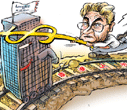Banking
Banks tighten credit card policies
(China Daily/Agencies)
Updated: 2009-08-31 07:53
Young people who can ill afford to acquire huge debts are more likely to embrace credit cards.
But as with Yuan, the result is sometimes devastating in a country where the law does not allow for credit card debts to be expunged by declaring bankruptcy.
Traditionally, most Chinese parents believe it's their obligation to pay their children's debts if the children are unable to do so.
Around 11 percent of Chinese parents have paid credit card debts for children ages 22 to 27, according to a survey by the newspaper Beijing Youth Daily.
"With credit cards, young people will quickly empty their parents' pockets," Lu of the Bank of Communications said.
Guo Tianyong, a professor at Beijing-based Central University of Finance and Economics, predicted China's credit card bad loan ratio would rise to 3 percent this year, up from 2.4 percent at the end of 2008. (In the US, it's about 10 percent.)
"A few years ago the ratio was only 1 percent, but this year it will undoubtedly rise as people's incomes fall amid the global financial crisis," Guo said.
New restrictions
Banks have started to take action.
CITIC Bank suspended its college student card in February. Soon after, China Merchants Bank halted its credit card designed for college students.
|
||||
Chinese banks were eager to grab market share in a rapidly expanding market, and sometimes resorted to unethical practices.
Last year, students at a Xi'an university were astonished to discover they had been given credit cards by a major Chinese bank.
The university had filled in the application forms without the students' consent or signatures to help the bank achieve its credit card quota, resulting in more than 10,000 credit cards being issued to unwitting students.
Before the recent crackdown, credit card peddlers could be seen everywhere from shopping malls to student dormitories.
Banks not only pressured their own staff to issue cards, but also outsourced the business to third parties.
Several banks now have set up special collection teams for bad loans.
They used to send reminder text messages or call the debtors, but now they go directly to customers' home.
But all the measures seem too late for Yuan's son.
Collection agents visited Yuan's home 10 times in June to demand that he pay his son's debts.
They threatened to put his son in jail if the bills went unpaid.
"I am from the old generation and I spend what I earn," Yuan said.
"I really have no idea about this way of consumption," he added.












